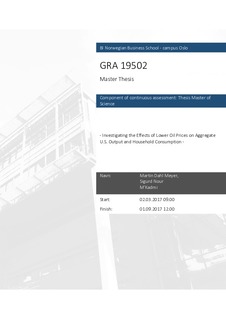Investigating the effects of lower oil prices on aggregate U.S. output and household consumption
Master thesis
Permanent lenke
http://hdl.handle.net/11250/2485976Utgivelsesdato
2017Metadata
Vis full innførselSamlinger
- Master of Science [1621]
Sammendrag
In the last decade, there has been a gradual structural shift occurring in the U.S.
economic landscape. Decreasing oil imports coupled with a booming oil sector and
increased crude oil exports, implies that the oil sector now represents an increasingly
larger part of total U.S. GDP. In light of the fracking revolution and the recent oil
price decline of 2014, this thesis utilizes a SVAR model to study the effects of lower
oil prices on U.S. real GDP and PCE. In so doing, we aim to investigate whether the
transmission of an oil shock to U.S. economic activity has changed. Our analysis of
the historical decomposition with data ranging from 1975-2016 suggests that the
transmission of an oil shock remains unchanged. This is in line with findings made by
Baumeister and Kilian (2016). Despite these findings, the effects of an oil price
decline on U.S. real GDP and PCE are different when considering the recent changes
in the U.S. economic landscape. Our findings suggest that an oil price decline has a
significantly negative effect on both GDP and PCE post 2000. This is attributed to a
number of changes; The increased importance of the oil sector as a contributor to
U.S. GDP implies that reduced investments in the oil sector, as a consequence of
lower oil prices, adversely affect GDP growth. Further, following the financial crisis,
the FED rate was reduced close to the zero lower bound, effectively constraining the
power of the FED to influence economic activity. Finally, a general cooldown of
global economic activity implies reduced demand for American goods.
Beskrivelse
Masteroppgave(MSc) in Master of Science in Business, Economics - Handelshøyskolen BI, 2017
